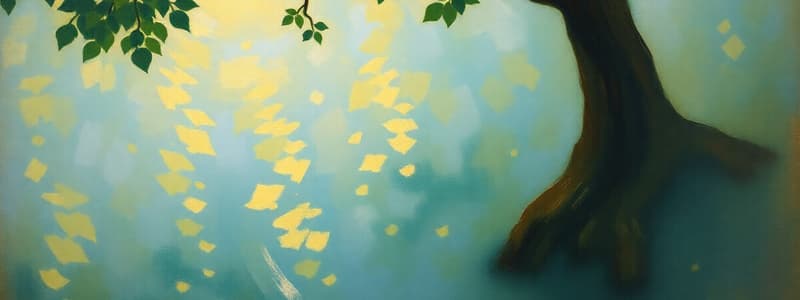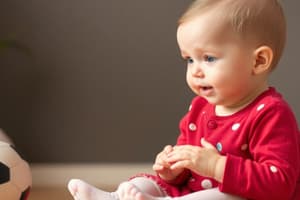Podcast
Questions and Answers
What is the typical phrase used to inquire about someone's offspring?
What is the typical phrase used to inquire about someone's offspring?
- Are you a parent?
- How many babies have you had?
- How many children do you have? (correct)
- Do you have any kids?
What does the possessive form of 'babies' indicate?
What does the possessive form of 'babies' indicate?
- Belonging to one baby
- A singular baby
- Belonging to multiple babies (correct)
- Multiple babies
Which of the following phrases is considered less common for asking about children?
Which of the following phrases is considered less common for asking about children?
- Do you have any children?
- How many babies have you had? (correct)
- How many children do you have?
- Are you expecting?
What age is Anna in her pregnancy at the time of the conversation?
What age is Anna in her pregnancy at the time of the conversation?
Why might someone say 'has Ana had her baby yet'?
Why might someone say 'has Ana had her baby yet'?
What is the proper term for a single child?
What is the proper term for a single child?
What phrase did Anna consider less typical when asking about children?
What phrase did Anna consider less typical when asking about children?
What does 'baby' change to when pluralized in pronunciation?
What does 'baby' change to when pluralized in pronunciation?
What does the phrase 'where is the baby's hat?' refer to?
What does the phrase 'where is the baby's hat?' refer to?
What is another way of asking about someone having children?
What is another way of asking about someone having children?
What is Anna's opinion on how Kate Middleton dresses?
What is Anna's opinion on how Kate Middleton dresses?
How do people typically respond when they hear about someone's pregnancy?
How do people typically respond when they hear about someone's pregnancy?
Which option describes a common mistake students make with baby vocabulary?
Which option describes a common mistake students make with baby vocabulary?
What is meant by the term 'newborn'?
What is meant by the term 'newborn'?
Which sentence correctly uses the term 'born'?
Which sentence correctly uses the term 'born'?
What does the phrase 'wetting the baby's head' mean?
What does the phrase 'wetting the baby's head' mean?
In what context is the term 'infant' used?
In what context is the term 'infant' used?
Why might someone say, 'I wasn't born yesterday'?
Why might someone say, 'I wasn't born yesterday'?
What can be concluded about the cultural attitude toward marriage in this context?
What can be concluded about the cultural attitude toward marriage in this context?
What does the term 'toddler' refer to?
What does the term 'toddler' refer to?
When discussing age, why do people say 'I am turning 30' instead of 'I have 30'?
When discussing age, why do people say 'I am turning 30' instead of 'I have 30'?
What is a potential misconception about using 'birth' and 'born'?
What is a potential misconception about using 'birth' and 'born'?
What is the typical cost of a wedding in the UK as mentioned?
What is the typical cost of a wedding in the UK as mentioned?
How is the term 'child' used in this context?
How is the term 'child' used in this context?
What is the primary distinction between 'birth' and 'born'?
What is the primary distinction between 'birth' and 'born'?
When can 'place of birth' be used instead of 'where were you born'?
When can 'place of birth' be used instead of 'where were you born'?
Flashcards
Babies
Babies
The plural form of "baby" referring to more than one baby
Baby's
Baby's
The possessive form of "baby" indicating something belonging to a baby
How many children do you have?
How many children do you have?
A common way to ask about the number of children someone has. It implies a general inquiry.
How many babies have you had?
How many babies have you had?
Signup and view all the flashcards
Had
Had
Signup and view all the flashcards
Had her baby
Had her baby
Signup and view all the flashcards
Congratulations on the new baby
Congratulations on the new baby
Signup and view all the flashcards
Giving birth
Giving birth
Signup and view all the flashcards
Arrival of a child
Arrival of a child
Signup and view all the flashcards
Gender of the baby
Gender of the baby
Signup and view all the flashcards
Excited about the new baby
Excited about the new baby
Signup and view all the flashcards
Being pregnant
Being pregnant
Signup and view all the flashcards
Due date
Due date
Signup and view all the flashcards
Congratulations on your pregnancy
Congratulations on your pregnancy
Signup and view all the flashcards
Contractions in sentences
Contractions in sentences
Signup and view all the flashcards
Born
Born
Signup and view all the flashcards
Birth
Birth
Signup and view all the flashcards
Royal Baby
Royal Baby
Signup and view all the flashcards
I wasn't born yesterday
I wasn't born yesterday
Signup and view all the flashcards
Maternity Leave
Maternity Leave
Signup and view all the flashcards
Newborn
Newborn
Signup and view all the flashcards
Infant
Infant
Signup and view all the flashcards
Toddler
Toddler
Signup and view all the flashcards
Dummy
Dummy
Signup and view all the flashcards
Pram
Pram
Signup and view all the flashcards
Sling
Sling
Signup and view all the flashcards
Moses Basket
Moses Basket
Signup and view all the flashcards
Child Minder
Child Minder
Signup and view all the flashcards
Changing Mat
Changing Mat
Signup and view all the flashcards
Playpen
Playpen
Signup and view all the flashcards
Study Notes
Baby Vocabulary and Phrases
- Baby vs. Babies: "Baby" is singular, "babies" is plural. Possessive forms: "baby's" (one baby) and "babies'"(more than one baby). Pay attention to spelling for possessive use.
- Asking about Children: Common way to ask about children is "How many children do you have?" "How many babies have you had?" is less common, used when referring to the act of giving birth.
- Children/Child: "Children" is plural, "child" is singular. Use 'do you have any children' if unsure.
- Phrases using "Born/Birth":
- "Born" is a verb, always used with helping verbs (e.g., "was born," "will be born"). Refers to the child coming into the world.
- "Birth" is a noun referring to the act of giving birth, usually used with "give" (e.g., "gave birth"). Refers to the mother.
Baby Related Vocabulary
- Newborn: Refers to a very young infant (up to a few months old).
- Infant: Refers to a very young child.
- Child: A general term for anyone under 16 years of age.
- Toddler: Refers to a young child who has just learned to walk.
Baby Items and Needs
- Dummy/Pacifier: Comfort item for babies, a dummy sticks into the mouth of the child
- Pram/Buggy/Stroller: Baby carrier (with wheels).
- Sling: A wrap that holds the baby close to the body.
- Wipes: Tissues for cleaning.
- Nappy/Diaper: Protective absorbent material for a child. (In British English, use nappy; in American English use diaper).
- Changing Mat: Padded surface for diaper changes.
- Playpen: Portable enclosure for a child to play safely.
- Thermometer: Tool to measure temperature.
- Cot/Crib: Baby bed.
- Bouncer: Reclining chair to soothe an infant.
- Moses Basket: Woven portable cot.
- Car Seat: Special seat for babies in cars.
- Muslin: Soft cloth for cleaning or burping.
- Sleep Suit: Clothes worn by babies to sleep.
- Baby Monitor: Radio for parents to hear the baby in a different room.
- Feeding: Breastfeeding is encouraged but not forced.
- Nursing Bra/Breast Pads: Support and protection for breastfeeding mothers.
- Breast Pump: Device for expressing breast milk.
- Bottle/Teat: Feeding via a bottle.
- Bottle Brush: Cleaning tool.
- Pureed Food: Food mashed into a liquid form.
- Solids: Hard food (e.g., biscuits, vegetables).
- Bib/Apron: Clothing to prevent food.
- Highchair: Baby chair for eating.
Care Providers
- Daycare/Day Nursery: Supervised play area for young children.
- Nursery: (for toddlers) Play and developmental activities.
- Nanny: Person who cares for a child in their home.
- Babysitter: Short-term care provider.
- Childminder: Person who cares for a child in their own home.
- Kindergarten (in the UK context): Incorrect term, use 'nursery' or 'early years setting' instead
Other Related Terms
-
Royal Baby: A baby born within the royal family.
-
Wetting the Baby's Head: Phrase for celebrating a baby's birth by drinking alcohol.
-
I Wasn't Born Yesterday: Phrase expressing knowledge and understanding.
-
Homeschooling: Alternative learning method, regulations vary.
-
Statutory Maternity Pay: Money paid to mothers during maternity leave.
-
Maternity Leave: Time allowed to look after a baby, with paid leave varying by law.
-
Mobile (toy): Decorative structured hanging toy suspended freely in air.
-
Rattle: Noisy toy for babies to shake.
-
Blocks: (usually building blocks) Toy cubes or shapes.
-
Teddy Bears/Teddy: Stuffed animal for a baby.
-
Fingerless Gloves: Gloves with exposed fingers..
-
Clothing: Onesies, Mittens, Bootlegs
-
Additional words:
-
"Full-time" vs. "Part-time"
-
"Forbid" vs "Not allowed."
-
"Pregnant" vs. "expecting"
-
"To express milk" to pump out breastmilk.
Studying That Suits You
Use AI to generate personalized quizzes and flashcards to suit your learning preferences.




